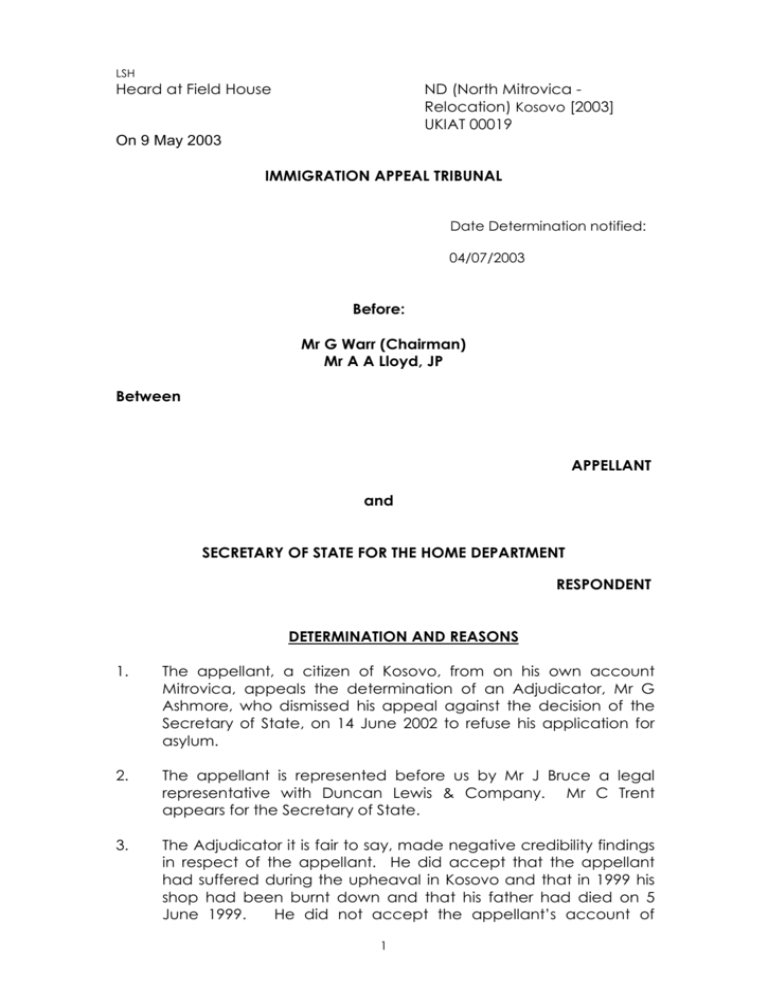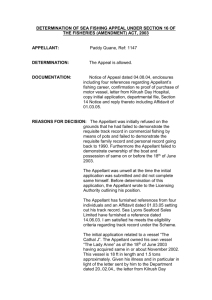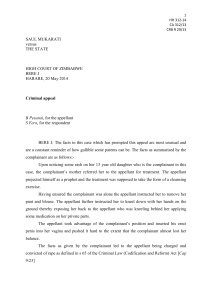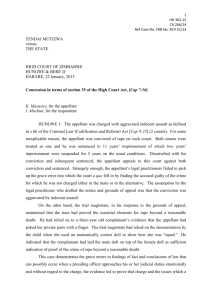secretary of state for the home department
advertisement

LSH Heard at Field House ND (North Mitrovica Relocation) Kosovo [2003] UKIAT 00019 On 9 May 2003 IMMIGRATION APPEAL TRIBUNAL Date Determination notified: 04/07/2003 Before: Mr G Warr (Chairman) Mr A A Lloyd, JP Between APPELLANT and SECRETARY OF STATE FOR THE HOME DEPARTMENT RESPONDENT DETERMINATION AND REASONS 1. The appellant, a citizen of Kosovo, from on his own account Mitrovica, appeals the determination of an Adjudicator, Mr G Ashmore, who dismissed his appeal against the decision of the Secretary of State, on 14 June 2002 to refuse his application for asylum. 2. The appellant is represented before us by Mr J Bruce a legal representative with Duncan Lewis & Company. Mr C Trent appears for the Secretary of State. 3. The Adjudicator it is fair to say, made negative credibility findings in respect of the appellant. He did accept that the appellant had suffered during the upheaval in Kosovo and that in 1999 his shop had been burnt down and that his father had died on 5 June 1999. He did not accept the appellant’s account of 1 having been attacked in July 2001 in his home in North Mitrovica on two occasions, nor that he had gone into hiding in February 2002. The Adjudicator’s findings are not supported with any degree of enthusiasm by Mr Trent who accepts that the Adjudicator’s use of language in particular paragraphs of the determination suggest the application of too higher standard of proof. For example, in paragraph 9, the Adjudicator states that the appellant would have had no difficulty in establishing by local records “or other incontrovertible documents” that he actually lived in Mitrovica. The Adjudicator’s determination continues as follows: “A shop owner or proprietor I would have expected the location of these premises to be confirmed beyond question. I am not persuaded the appellant emanates from this area”. 4. Mr Trent submits that the appellant would not on even the most benevolent interpretation of the facts in his favour be unable to benefit from a general sufficiency of protection in Kosovo in present circumstances. Mr Trent’s position is fortified by the fact that in support of the appellant’s claim Mr Bruce relied on the April 2002 UNCHR position paper which lists protection categories which appear on page 20 of the appellant’s bundles. The position paper at that stage was of the view that while most Kosovo Albanians were able to return without protection difficulties, certain categories of Kosovo Albanians who might face serious problems included Kosovo Albanians originating from areas where they constituted an ethnic minority. Mr Bruce accepts that this category no longer appears in the UNHCR position paper published in January 2003. 5. Mr Trent in his submissions drew our attention to the Country Assessment which is in the appellant’s bundle and in particular to paragraphs 6.25 and 6.33. In the latter paragraph the Secretary General of the UN Security Council reported on 17 July 2002 that “over the past few months a climate has been created that for the first time since the arrival of UNMIK appeared conducive to promoting inter-ethnic return”. This, the assessment states, reflects an increasing interest and commitment from UNMIK and the international community to address actively the situation of minorities and return as a matter of priority. In paragraph 6.35 it is reported that ethnic Albanian leaders at the highest level including the Prime Minister have made statements in favour integration and non-discrimination. The ex-KLA leader Hashim Thaci was reported as stating in the run-up to the October elections that “the return of refugees did not endanger Kosovo. On the contrary, it stabilises it, democratises it and opens immediate prospects for Kosovo’s independence”. In paragraph 6.25 it is stated that before the conflict ethnic Albanians made up over 90% of the population of Kosovo, the percentage is even higher now as large number of the Serb and 2 Roma communities fled from Kosovo, those who remained are mostly concentrated in mono ethnic areas. In the immediate aftermath of the war there was a very high level of violence directed at ethnic minorities, Serbs and Roma in particular. It is assumed that most perpetrators were ethnic Albanians seeking revenge and or pursuing the aim of a wholly Albanian state. But, the number of incidents it is stated in paragraph 6.26 of violence against minorities had decreased significantly with a notable improvement in the security situation during the year 2001. 6. The Adjudicator found that the appellant was an ordinary Albanian in paragraph 22 of his determination. Mr Bruce states that there is no evidence that the appellant is other than in good health, he is comparatively young. Mr Bruce is unable to take us to material other than an out of date UNHCR position paper to indicate that the appellant would be at risk in current circumstances. It follows that he would not face persecutory treatment on return in our view but, even if he was disinclined to re-settle in his former home in north Mitrovica, we cannot find on the material before us that it could possibly be described as unduly harsh for him to live elsewhere, for example, in Pristina. Mr Bruce has taken us to no material that would indicate that that would be so. Accordingly, despite the admitted imperfections in the Adjudicator’s determination, the Tribunal does not accept that the United Kingdom would be in breach of its international obligations by returning this appellant to Kosovo. Accordingly, this appeal is dismissed. G Warr Vice President 3







